| |
| Ernest Caleb (Ernie) Healey |
| In his own words |
| |
This memoir provided some for the material for my take on Dad's life as used for the Hosking reunion book and on this site. It is presented below verbatim (well, almost). In some places where there were two or three sentences running into one another in a long and sometimes jumbled narrative, I have made corrections to punctuation and grammar where I thought it necessary for comprehension. Otherwise, it's a warts and all transcript in his own words. |
The original was written by hand between 1999 and 2001. Narrative and photos / notes were on alternative pages so things might look a little disjointed in the following transcript. Dad had also revisited the memoir at later times and added bits in here and there as he remembered other things. Some of the photos were glued into the original. I've added others. More photos of Ernie and family on the Healey page. Now, over to him. |
|
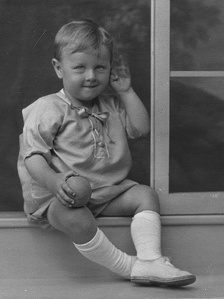
Aged 2 years 8 months |
I was born in Grey Lynn, Auckland on the 4th of March 1921. My father was Arthur Healey and my mother Clara Hosking. I had two sisters, Connie who died of Diptheria at the age of five, and of course I did not know her. My elder sister Madge now 81 lives in Helensville. The family moved to Waiuku and that is where Warwick & Gary were born. I did not attend school until I turned six and all my school days attended the Waiuku District High and primary school. The school motto was “Honour before Honours”. A good motto. I walked to school a distance of about 1½ miles and sometimes walked home by the way of the railway line as it was shorter. |
|
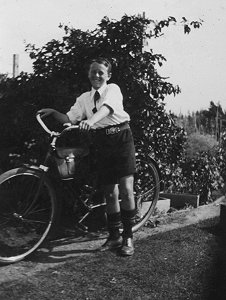
Aged 13. Form 2 |
I can remember my first day at school, which I found rather frightening, but soon settled in. Mostly I enjoyed my high school days because of the sports and odd trips. One trip by train I remember was to visit the ship Orari at Queen’s Wharf. She was a large vessel – cargo & passenger. She was sunk during the war on the Malta run I think. <Note added later: Orari found not sunk but damaged by bomb.> The actual high school consisted of forms 3, 4, 5 & 6. Only four or five in the 6th form and about 100 total in the others. Nine of my mates were in the air force and only two survived. My best mate is buried in Denmark, two in Germany, one in England, one in the English Channel and the others – who knows?
In picture at right, Ernie is 2nd from right in front row.
|
|
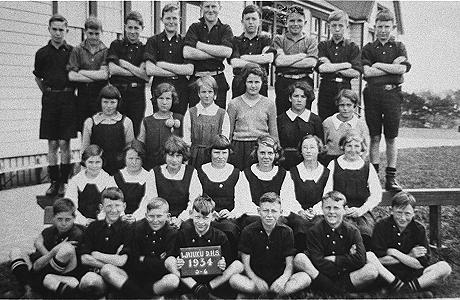 |
| |
|
I left school in 1936 aged 15 and worked in the local post office as a message boy; delivering telegrams, sorting mail and clearing the local post boxes. Later I was a postman and telephone exchange operator. My pay was £1-19-11 (just under $4) plus 6d (5c) a fortnight for using my own bicycle. Out of this I paid 6d per week to the P.O. Association and 10 shillings ($1) to my mother for my keep. Every pay day I bought 3lb bananas and 1lb peanuts in shells. (1lb = 450g) There wasn't much left. |
|
|
|
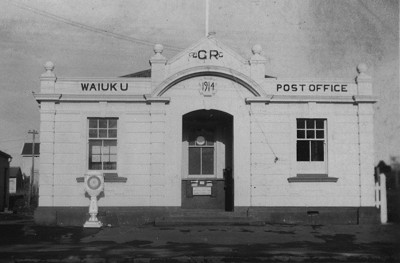 |
| |
Not long after I started work in the Post Office it was my job to make the ink to fill all the ink wells in the public area. I used ink powder which I mixed with water in a stone jar. This brew must have been very potent as it soon rotted all the pen nibs. One day after mixing up the ink I dropped the jar full bottom down on a thick mat. The ink gushed out all over me face, eyes and down my first suit. It would have been hilarious on TV but I was not impressed nor was Mum. Suit ruined. The postmaster said “I hope you haven’t wasted all that ink”. That did not improve my opinion of him & I always intensely disliked him. |
| |
The war started in 1939 and Dad bought a car from Stan Andrews of Pukekohe. Madge and I went there a couple of times for driving lessons. The car was a Ford 10 Prefect – the first of that type. Petrol rationing then started and we could only get 1½ gallons per week, but I used to get a few coupons from a local rural delivery man who delivered mail and papers etc. to Glenbrook. About this time there was a snow fall on the sand hills and Pukekohe Hill, and a few flakes fell in Waiuku. There had never been snow there before or since. |
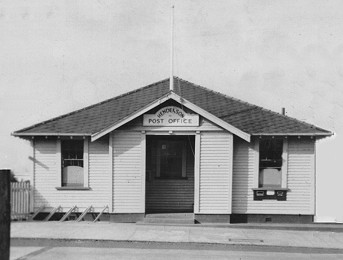 |
|
Now I was transferred to the Henderson Post Office as a telephone exchange operator. It was a very busy exchange, as a call to Auckland was a toll call, and cost 3d for three minutes, so we were very busy writing toll call tickets. Hardly worth the time. I had only been in Henderson for two weeks when I got appendicitis and Steve Ozich where I boarded had the only taxi. He took me to Auckland Hospital for a fare of £1 ($2). I was operated on around 11:00pm and after a week or so my operation started bleeding internally, so I had to be operated on again to remove a large clot. I was in hospital for three weeks, then home on leave for two weeks before returning to Henderson. Steve Ozich died a couple of years ago. He was over 100 years old. During my time at Henderson, people sometimes gave me fruit or a glass of wine. One day I had two large glasses and fell off my bike in Te Atatau Rd. Got as far as Tui Glen and had to sit down - went to sleep. So I would be at least an hour late returning to the P.O. Let down back tyre and pushed bike about ¾ mile back to P.O. so had a good excuse eh. No problem. I think the postmaster was suspicious - might have smelt my breath eh!! |
| |
After six months in Henderson, I was transferred to Whakapara, about four miles (6½ km) north of Hikurangi. The post office was on one end of the railway station and when the goods trains were shunting, we used to sneak out and pinch the coal off the railway trucks as they stopped right outside our door. We cooked on a coal range. There were three of us baching there, and there were two other locals on the staff. I played quite a bit of cricket locally – real village green stuff, but there were a few good players around. |
| |
Before I left Henderson I joined the territorial army – the NAMR North Auckland Mounted Rifles (without horses). My calling up papers arrived after I had been back in Whakapara some eight months. So it was off to Waiouru in February. Arrived early morning, very dusty in this huge area. My first army meal was curried sausages and I broke off a tooth on a bit of grit. We were in six-man bell tents. Each man got a palliasse of scrim packed with straw and six blankets but no sheets or pillow like the jailbirds get in Mt Eden. |
| |
Anyway, I quite enjoyed my three months in the army and back to the PO. This time to Upper Symonds St telegraph school to learn Morse code. Had my tonsils taken out at Huia Private Hospital in Grafton Rd sometime – cannot remember when. I passed my test at 25 words per minute. I used to classes by tram from Sandringham Rd where I boarded near Eden Park. |
| |
Now to the Chief PO telegraph dept. sending and receiving telegrams. I had four POs to look after – Mt Eden, Epsom, Mt Albert and Waiuku. After three months or so I got transferred to Kohukohu where I boarded in a private house with another PO member, a school teacher, a bank clerk and a mechanic. After about nine or 10 weeks I was called up to do a signals course at Trentham military camp, and after the course I was sent to Epsom showgrounds awaiting further posting. Was not long in Epsom before being posted to Divisional Signals unit attached to NAMR at Waimate North. Was promoted from Signalman to Lance Corporal. This resulted in an increase in pay of 6d a day (5c). Oh joy!! |
|
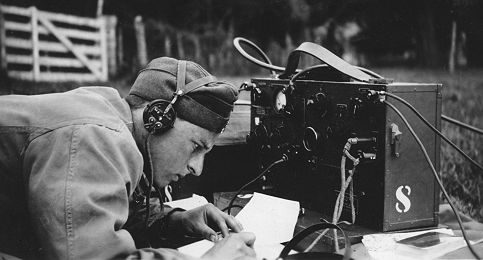
Wireless training at Trentham |
| |
My next move was to Ngaruawahia military camp for a course on the Bren gun carrier, and the course was shortened because the Japanese attacked Pearl Harbour and there was a bit of a panic on. We were sent back to our units, left Waimate North to a camp in Sweetwater, northwest of Awanui, which is north of Kaitaia, and handy to Ninety Mile Beach. I had a leave and went home to Waiuku where I had 3 or 4 teeth out. I did not know the dentist was blind in one eye, and I reckon could not see out of the other. He made such a mess of my gums but left the roots in. Had to get our doctor to try to stop the bleeding & eventually I finished up in Auckland Hospital & a specialist repaired the damage. Thence to Auckland Racing Club Ellerslie Showgrounds, an army rehab hospital. After a week or so some more leave and back to Sweetwater. |
|
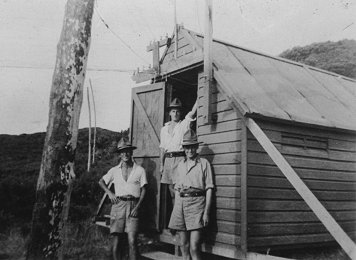
Standing in doorway of signals hut at Sweetwater |
About this time I knew I would be called up for overseas service & probably sent to the Middle East, so not wanting that I decided to join the navy. I passed my navy medical in Philomel, and a few weeks later got notice to report and was taken to Motuihe (HMS Tamaki) for 3 months training. I had applied to join as a telegraphist but was told there were none of those classes entering at that time, so I joined a seamans class. About a fortnight later in comes a telegraphist class. There were 28 in the class and 14 of us are still in the land of the living. None were killed during the war, but some (3) were killed in accidents & 11 have passed on due to illness. |
| |
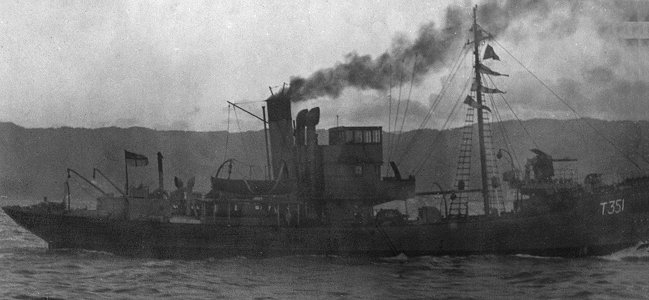
|
|
My first draft was to a steel minesweeper at Port Chalmers (Dunedin) & several of us took train & ferry. The ship was a new one built locally. We had a crew of about 25 – 3 officers, 4 petty officers, 1 chief petty officer, rest seamen, asdic operators, 1 signalman, 3 stokers, 3 telegraphists.. HMNZS “Pahau”. Our armament consisted of one 12 pounder, one Lewis Gun and depth charges. We left Port Chalmers for Picton where we stayed for a week or so to do working up trials & also did a fair bit of fishing – plenty of fish, and then on to Wellington for mine sweeping outside heads on the approaches to the harbour. I was 9 months on the Pahau and lost many a meal to sea sickness. Cook Straight is a very rough area at times & I fed plenty of fish there. Back to Philomel and drafted to the UK. Sailed from Auckland 25/02/1945 on the Ruahine with a draft of 180 officers & ratings via Panama Canal and New York escorted by a US destroyer. |
At New York picked up a convoy of 40 odd ships and joined another convoy off Halifax Nova Scotia., a total of 84 ships with naval escort. The convoy was made up of various cargo ships of many countries, also oil tankers, some of which also had deck cargoes of aircraft and railway locomotives. There were quite a number of US liberty ships. About mid-Atlantic ran into a force 9 storm & the convoy was broken up somewhat & this happened later in a heavy fog. We couldn’t even see the mastheads or any other ships. It was very eerie hearing various ships foghorns. After the storm & fog, approaching England on a flat calm sea, & in clear sunny weather around 12 noon, the ship on our starboard side was hit by two torpedoes. I saw the second one hit & a big cloud of smoke & dust flew up mast high. This ship was a tanker & there was a whoosh & up she went in a flaming explosion, the fuel spilling aflame over acres of sea. No survivors. What a tragedy & so near the war's end. We used to wave out to the crew in the next column. So on to the UK & south of England the convoy divided, one lot to Liverpool and our lot to Gravesend on the Thames. Approaching the estuary we could see the wrecks of many ships sunk during the war. There were masts & funnels sticking up everywhere like a forest. These vessels had being sunk by bombs & torpedoes and headed on to the sandbanks & shallows. So we landed at Gravesend, caught a train into London and had supper at a servicemans club run by the ATS girls. Some hard cases here. |
|
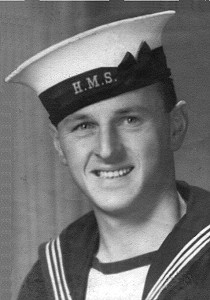 |
| |
|
1 am. Train then to Plymouth Priory and navy transport (trucks) to the Devonport barracks arriving about 10 am. Checked over, then transport to Lyneham & a commando camp in a wooded area in nissen huts. Two weeks leave so headed back to London. I went up to a farm at a country area called “Bishop Wilton” in Yorkshire. Travelled on the Flying Scotsman to York. The station had been bombed and had no roof. Caught a bus to Pocklington. Arrived there eventually after the girl conductor put me off at the wrong spot called “Bishop Burton”. Too many bishops in England I reckon. Had to catch another bus to the farm 4 miles. So stayed on the farm for 5 or 6 days mostly shooting crows and doing the farmer’s books. His cows were all named and I entered their production in a record book. There was only farmer, wife & son (Billie). Billie was my age & a real yokel, and the father I could hardly understand, real Yorkshire lingo. He said I was a “rum ‘un” but was surprised I spoke so well. Well a couple of rooks I shot were for the pot & also a rabbit. I didn’t get to taste ‘em though, they were still hanging on the wall when I left and perhaps their remains are there still. War over in Europe. |
| |
Back to London to celebrate VE Day. Very hot, tar was melting on some roads. Back to Lyneham, had a game of cricket took 4 wickets in succession. The ball landed in a clump of stinging nettle & I plunged my hand in to get it. Very foolish. The batsmen weren’t very skilled. About the only work I did at Lyneham was whitewashing tree stumps and trunks and road verges and also doing shore patrols at Newton Ferris, Totnes and Torquay. We went to Totnes by train. Slept in the crypt of a church where there were various items of torture stored, thumb screws etc., returning to Plymouth by workers train in the morning. Had another leave, 10 days and back to Lyneham and drafted to HMS Devonshire an 8" heavy cruiser of the county class. Joined her at Plymouth with a group of kiwis (19 or 29 of us) cannot remember how many. Had a day leave and visited the city which was virtually destroyed by bombing. Had a haicut for sixpence and visited Plymouth Hoe, Drake’s stamping ground. |
| |
So left Plymouth 28th June 1945 our first stop Port Tewfik Suez Canal had a game of cricket against the army. I was bowled for a duck by another kiwi. Hot & sweaty. Secured to buoy at Aden. Now through the Red Sea into the Indian Ocean. It was somewhere here we ran into a bit of a heavy swell. The deck was wet and I slipped in my gym sandshoes and hit my head a hell of a bump. Out unconscious. Woke up in sick bay getting my left eyebrow stitched up. Temporary loss of memory but recovered it after a while. Was told I was skidding out under the guard rails when one of the marines grabbed hold and pulled me back aboard. He saved my life. I gave him a paua necklace I had taken from NZ to give as a present maybe to someone in England but didn’t. Actually I had forgotten about it. |
| |
Next stop Colombo capital of Ceylon (now Sri Lanka). Had a run ashore very hot and smelly. Moon stones were cheap and I should have spent up large as I could have made a good profit back home. Wise afterwards. Next stop Freemantle but did not go ashore. On again to Sydney arriving 29th July & took train to naval camp HMS Golden Hind about 20 miles from Sydney next to racecourse Warwick Farm. Visited Uncle Ernie & Auntie Flo at Rose Bay & cousins Bob & Eric [Japs kaput] at Dover Heights & Newcastle St. 3rd August 1945 drafted to fleet carrier HMS Colossus. Went ashore daily for a gunnery course run by the Aussies and few days training in Jervis Bay. Mostly training flying off & landing. Sailed for Manus just north of New Guinea right on the equator. Hottest place ever. NZ cruiser just over the way at anchor HMNZS Archilles. Sailed for Hong Kong, stayed a few days, left for Leyte & Manila Bay. The bay was full of sunken ships and some still had dead Japanese aboard and very smelly. Secured to buoy. Sailed for Shanghai, anchored off Yellow River. The sea was yellow miles out. Sailed to Jinsen Korea, picked up POWs English & Aussie. Returned them to Hong Kong. Drafted to escort carrier HMS Reaper & returned to Sydney and back to Golden Hind. Now back to Reaper again and off to Auckland & Philomel 15th Nov 1945. Drafted to navy communication station at Waiouru as quartermaster till 28th Feb 1946. Played cricket in Taihape. Didn’t get a bat. Returned to Philomel and discharged 29 March 1946. Why oh why did I do this? I should have stayed home. But it opened my eyes and I saw how others lived and after all it was free travel.
|
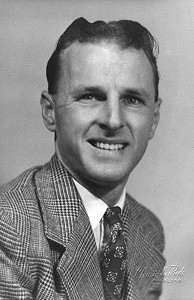 |
So now back to Waiuku P.O. Not there long when transferred to Mercer for a year or so. Played a lot of cricket and met many friends. Requested a transfer back to Waiuku as Mum was ill and eventually died of cancer of the pancreas. I found it hard to settle and could not get on with the idiot of a Postmaster so resigned and started a plant nursery, built 3 glasshouses growing annuals, perennials & bulbs. Later mostly cut flowers which I supplied to the city markets. I went to the markets twice weekly, Sunday night & Thursday morning.
Married 5-4-1950 Betty Gracie.
1st son Warwick born 20-3-51. 2nd son Gary born 26-12-53. Both born Franklin Memorial Hospital, Waiuku. Met Betty at Red Beach summer of 1950 and thought I had better strike fast so as you see married soon after before somebody beat me to it. |
|
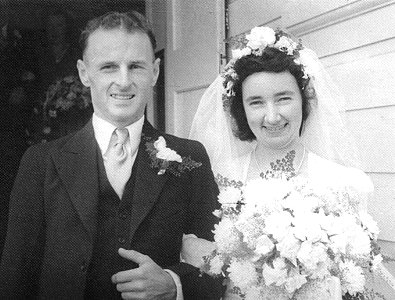 |
| |
|
| |
Some years later we moved to Meadowbank where I worked at an orphanage as a gardener for 3 years, then bought a house in Papatoetoe. Worked for Winstones nursery in Shore Road for 6 weeks, then Rosella Nurseries Mangere for a few years. Left there and worked at Dominion Breweries as a truck driver for 20 years & retired the day I turned 60. Had a heart operation in May 1998 in Greenlane Hospital. It is now April 1999 and I am still interested in gardening. |
I regret going back to the P.O. after I left the navy and I often wish I had joined the merchant service or perhaps taken a rehab course in some trade perhaps carpentry. I never really enjoyed the P.O. especially the moving all over the place. Quite a number of postmasters didn’t think like me. |
| |
During my younger days in Waiuku we were a relatively poor family, but got by as my parents did not waste money & we very seldom bought any veges or fruit as Dad had a big garden and used to sell a few plants etc. It was not until 1935 when the first labour government took office that things began to pick up. But generally speaking I enjoyed my early years. |
| |
| Unfortunately now, the govt is now only interested in their soft job and in my opinion no better than traitors. |
|
| |
| Here’s where I played cricket: |
Waiuku (many times) Auckland – Glenbrook – Waiau Pa – Mauku – Drury – Papakura – Hunua – Pukekohe – Tuakau – Mercer – Rangariri – Manurewa – Taihape – Waiouru – England (Lyneham) – Suez (ex-Devonshire) – Pokeno – Papatoetoe – Hamilton – Hukeranui – Otonga – Kaitaia – Kingseat – Paerata – (Cambridge Tauranga for Franklin). Was mostly opening bat made 2 centuries N.O. Got 2 ducks once. |
| Played rugby here: |
Waiuku (often) – Pukekohe – Awhitu – Manurewa – Tuakau – Papakura – Karaka – Bombay – Auckland – Huntly – Kaitaia – Paihia – Glenbrook – Takapuna – Paerata – Waimate North – Motuihe Island (HMNZS Tamaki) |
| |
| Played League here: |
| Waiuku (often) – Carlaw Park No. 2 – Glen Eden – Point Chevalier (Walter Park). |
| These awards I won when showing daffodils when I lived in Waiuku. |
| |
| The bromeliad prizes when I lived here in Papatoetoe |
| |
After I retired I did quite a bit of overseas travel 3 times to England by different routes. Once across the Soviet Union by the Trans-Siberian Railway & visited Hong Kong, Taiwan, Japan, Finland, Stockholm & Denmark on that trip. |
|
|
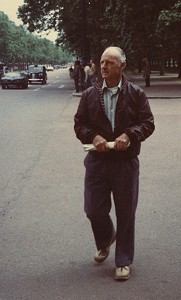 |
| |
| Pic…. In the Mall London after that trip 1982. |
| |
| So now I’m 80 and how quickly the time has passed. Had a good life, made many friends and made many mistakes but no enemies so far as I know. |
| |
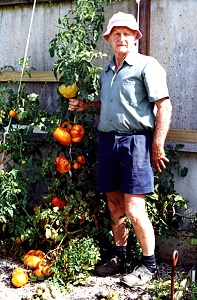 |
| |
|
|
| |
|